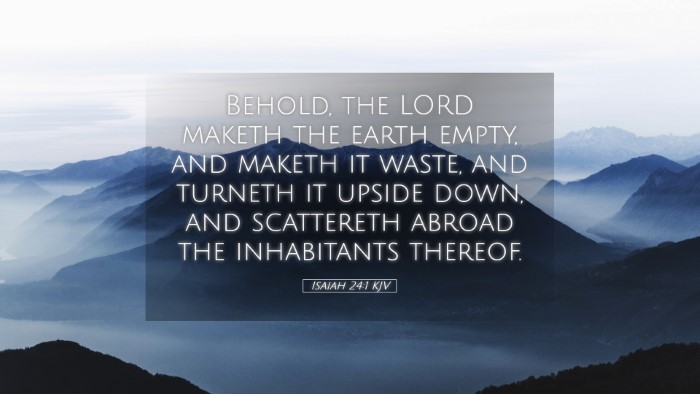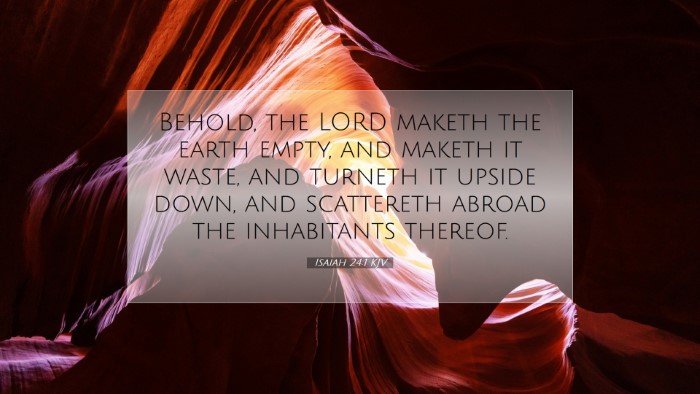Commentary on Isaiah 24:1
Text of Isaiah 24:1 (KJV): "Behold, the Lord maketh the earth empty, and maketh it waste, and turneth it upside down, and scattereth abroad the inhabitants thereof."
Contextual Overview
The passage in Isaiah is a part of a larger prophecy regarding the judgment that God will execute upon the earth. It encapsulates the themes of divine justice and the reversal of fortune that often accompanies the fall of nations and empires.
This pronouncement is not merely about the physical state of the earth but also about the moral and spiritual condition of its inhabitants. The earth is personified and depicted in a state of desolation as a result of God's judgment, drawing attention to the consequences of sin and rebellion against divine authority.
Divine Judgment and Its Implications
Matthew Henry's Commentary: Henry posits that this verse serves as an initial declaration of desolation that will sweep across the earth due to the sins of its inhabitants. This transformation from fullness to emptiness signifies the gravity of divine judgment. It underscores that God is sovereign over creation and demonstrates His authority to alter the state of the world according to His will.
Henry emphasizes the significance of "maketh it waste," suggesting that God not only diminishes the earth’s physical resources but also judges the nations that inhabit it. The imagery of "turneth it upside down" suggests a radical reversal of order, indicating that what was once upright and established will be brought low, with God’s judgment serving as the catalyst for this change.
Understanding 'The Earth' in Prophetic Literature
Albert Barnes' Commentary: Barnes highlights that "the earth" in this context can be understood as representative of the entire world and its systems. The emptiness described is both literal and metaphorical, speaking to a time when the joy and prosperity experienced by nations will be stripped away. This aligns with the prophetic tradition that often reveals God's displeasure through cosmic upheaval encompassing both the earth and its inhabitants.
He articulates that the scattering of inhabitants symbolizes a loss of societal cohesion and stability as divine judgment disrupts normalcy. Barnes encourages readers to understand this as a warning against pride and self-reliance, suggesting that the ultimate authority rests with God rather than human institutions.
Theological Reflections
Adam Clarke's Commentary: Clarke provides an in-depth theological reflection on the nature of God's judgment depicted in Isaiah 24:1. He discusses the promise of divine retribution and the fate of those who engage in systemic injustices and disregard for the moral order instituted by God. Clarke suggests that the "turning upside down" is emblematic of God's ability to upend the schemes of man, leading them to a place of desolation for their transgressions.
Moreover, Clarke warns against interpreting this judgment solely in a historical context, advocating instead for a continuous awareness among believers that such judgments serve as a reminder of God's holiness and the necessity of repentance. In this light, the emptying and waste of the earth can be seen as both a historical event and a future promise of God's ultimate restoration.
Practical Applications for Christian Living
- Awareness of Divine Sovereignty: Believers are reminded of God's control over human affairs and the natural world. This understanding should foster humility and reliance on divine grace rather than human wisdom.
- Call to Repentance: The themes in Isaiah challenge individuals to evaluate their lives and the corporate life of the church concerning sin and rebellion against God's instructions.
- Hope in Restoration: For the faithful, the desolation described is not the end. It serves as a precursor to renewal, prompting hope in the promise of God’s restoration after judgment.
Conclusion
Isaiah 24:1 encapsulates the profound themes of divine judgment and cosmic upheaval that are foundational within biblical prophecy. By combining insights from notable commentaries like those of Matthew Henry, Albert Barnes, and Adam Clarke, we can glean a deeper understanding of this verse's significance. This understanding is essential for pastors, students, theologians, and Bible scholars as they seek to comprehend the breadth of God's actions in history and their implications for faith and practice today.


